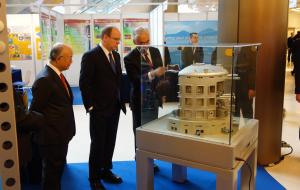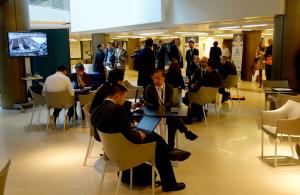ITER Director-General Osamu Motojima also expressed his gratitude to Prince Albert II "for his continual support of the ITER Project and his enduring generosity." In his opening remarks, the ITER Director-General stressed that the ITER Project is now entering its industrial phase. "It is from you," he said to representatives of industry from around the world, "that we have to learn in order to prepare the industrial and commercial future of fusion energy."
The first day of the conference—under the theme of "The Global Energy Landscape"—featured keynote lectures from Maria Van der Hoeven, Executive Director of the International Energy Agency (IEA), and Yukiya Amano, Director-General of the International Atomic Energy Agency (IAEA) (see quotes below).
In the afternoon, ITER Council Chair Hideyuki Takatsu presented the status of ITER, and Chris Llewellyn-Smith, director of energy research at Oxford University and former ITER Council Chair (2007-2009) explored the world's future energy needs ("With and Without Fossil Fuels"). A round table later gathered representatives of the seven ITER Members and of Agence Iter France for a wide survey of national energy policies and roadmaps to fusion energy.
All presentations converged from very different starting points to similar conclusions: fossil fuels will remain dominant for a few decades to come, and conventional nuclear energy still has a bright future ahead (especially in Asia where the energy demand is growing the fastest).
And as for fusion energy, most experts agreed that it will not reach the grid before 2050. However, assured Chris Llewellyn-Smith, "it won't be too late..."
The MIIFED 2013 conference concludes on Wednesday, 4 December. Below are excerpts from keynote speeches.
His Serene Highness Prince Albert II of Monaco:
"It is my country's sensitivity to environmental issues which triggered our decision to participate ... in the ITER Project."
"And it is a great pleasure for us to offer young researchers an opportunity to pursue their studies for two years in the ITER laboratories ... [With] every new class we take the full measure of their motivation and commitment."
Osamu Motojima, Director-General, ITER Organization:
"[The highly sophisticated ITER components] present tremendous opportunities for industry at large. As ITER drives technological development, it contributes to stimulate the strategic capabilities of the companies involved in the project."
"As representatives of industry, large or small, you have a lot to contribute to ITER and, beyond ITER, to the future of fusion research. It is you who tackle the very concrete issues of making real components—very complex components!—out of our designs. It is from you that we have to learn in order to prepare the industrial and commercial future of fusion energy."
"The men and women of ITER, coming from these 35 nations, are inventing a new and never-before-experimented way of working together. They are already setting an example for all future large-scale international collaborations."





